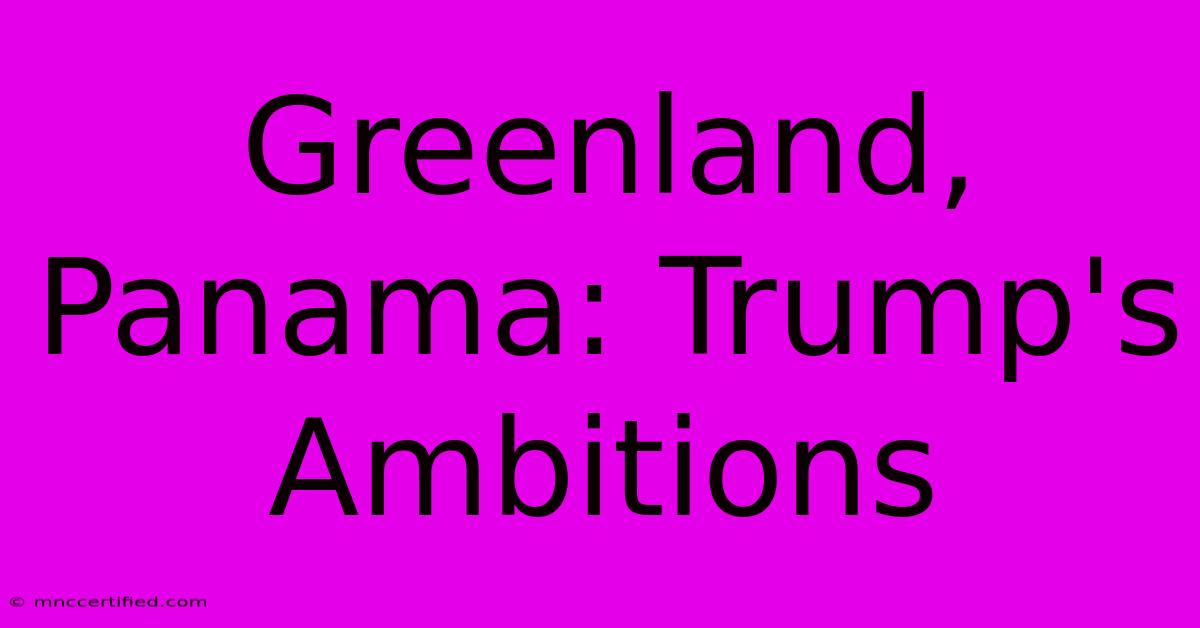Greenland, Panama: Trump's Ambitions

Table of Contents
Greenland, Panama: Unpacking Trump's Ambitious (and Controversial) Geopolitical Plays
Donald Trump's presidency was marked by a series of bold, and often controversial, geopolitical moves. Two particularly striking examples, seemingly disparate at first glance, were his expressed interest in purchasing Greenland and his approach to relations with Panama. Analyzing these actions reveals a broader strategy reflecting his "America First" ideology and its implications for global power dynamics.
The Greenland Gambit: A Failed Acquisition Attempt
In August 2019, the news that President Trump had considered – and reportedly attempted – to purchase Greenland from Denmark sent shockwaves around the world. The idea, swiftly dismissed by the Danish government, was met with widespread ridicule and raised questions about the Trump administration's foreign policy priorities.
Why Greenland? Strategic Importance and Resources
Trump's interest in Greenland wasn't entirely without strategic rationale. The island possesses significant geopolitical importance, situated strategically in the Arctic Circle. Its vast mineral resources, including rare earth elements crucial for modern technology, and its potential for increased military access in a rapidly changing Arctic landscape, held obvious appeal. The acquisition, however, presented enormous logistical and political hurdles.
The Fallout: Damaged Relationships and International Criticism
The proposal was widely criticized as tone-deaf, disrespectful, and reminiscent of colonial-era power plays. It significantly damaged US-Danish relations and highlighted a perceived disregard for international norms and diplomacy within the Trump administration. The incident underscored the limitations of a purely transactional approach to foreign policy, demonstrating that simple acquisitions are rarely achievable without considering complex political and social factors. The failed Greenland bid serves as a cautionary tale about the pitfalls of prioritizing national interests without due consideration for diplomatic sensitivities.
Panama: A Shifting Balance in the Americas
Trump's approach to Panama differed significantly from the Greenland gambit. While he didn't attempt an acquisition, his administration focused on renegotiating existing agreements and solidifying strategic partnerships. This reflected a broader strategy of strengthening relationships with key countries in the Americas to counter the influence of China and other perceived rivals.
The Panama Canal and Strategic Interests
The Panama Canal remains a crucial artery for global trade, making Panama a strategically vital nation. Trump's administration viewed strengthening ties with Panama as essential for maintaining US influence in the region and protecting its economic interests. This included renegotiating trade deals and emphasizing security cooperation.
Security and Economic Cooperation: A Different Approach
Unlike the impulsive Greenland attempt, the engagement with Panama reflected a more calculated, albeit still transactional, approach. The focus remained on securing US interests, but it was pursued through a combination of economic incentives and strategic partnerships rather than outright acquisition. This strategy emphasized collaboration and mutual benefit, contrasting sharply with the unilateral nature of the Greenland proposal.
Comparing and Contrasting Trump's Approaches
The contrasting approaches to Greenland and Panama reveal a nuanced picture of Trump's geopolitical strategy. The Greenland gambit, though ultimately unsuccessful, showcased a willingness to pursue unconventional, even audacious, moves to secure perceived national interests. The Panama strategy, however, demonstrated a capacity for a more conventional, albeit still self-serving, approach to foreign policy, focusing on strategic partnerships and economic cooperation.
Conclusion: Lessons Learned and Lasting Impacts
Both the Greenland and Panama episodes illustrate the complexities of navigating the global political landscape. They underscore the importance of diplomacy, respecting national sovereignty, and understanding the nuances of international relations. While Trump's actions generated considerable controversy, they also highlighted the enduring importance of strategic alliances and the pursuit of national interests in shaping global power dynamics. These events continue to shape the ongoing discussions around US foreign policy and its relationship with various nations across the globe. The lasting impacts of these approaches remain a subject of ongoing debate and analysis among political scientists and international relations experts.

Thank you for visiting our website wich cover about Greenland, Panama: Trump's Ambitions. We hope the information provided has been useful to you. Feel free to contact us if you have any questions or need further assistance. See you next time and dont miss to bookmark.
Featured Posts
-
Track Santas Flight Live
Dec 24, 2024
-
More Card Problems Christmas Shopping
Dec 24, 2024
-
Panama Canal Ownership And Trumps Plans
Dec 24, 2024
-
Why Are Young People Quitting Jobs
Dec 24, 2024
-
Bulldogs Season Ends In Ot
Dec 24, 2024